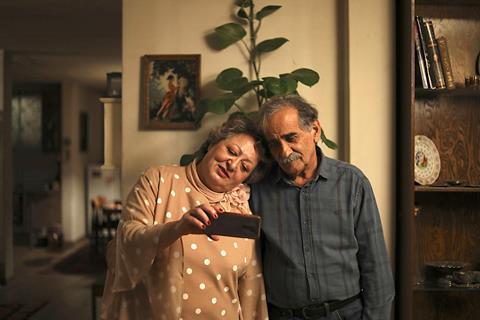
Maryam Moghaddam and Behtash Sanaeeha’s My Favourite Cake in is screening in Competition at the Berlinale today (February 16) but the directors are unable to attend the festival, having been prevented from leaving Iran by its government.
“Six months ago security guards raided our editor’s office, and took all the computers, hard drives and copies of the film,” said Sanaeeha. “They told us there will be a court case, and because of that we can’t leave the country.”
The government still holds their passports and has tried to make them withdraw the film from Berlin. “It feels like giving birth to a child; but you’re not there to watch it,” said Moghaddam of their non-attendance. The duo plan to connect via live video link should Tehran’s patchy internet hold up.
My Favourite Cake was filmed in Iran outside of the restrictive rules of the country’s censors as an Iran-France-Sweden-Germany co-production. Around 80% of filming took place in the house of a friend who they trusted to keep it confidential. The rest they had to get cleared by the authorities so the filmmakers provided a fake short film script and took the risk of shooting something different.
It was a method they had practised on their previous feature, Berlinale 2021 title Ballad Of A White Cow and it’s a form of underground Iranian filmmaking that several others filmmakers also utilise when shooting in Iran.
Now some of Moghaddam and Sanaeeha’s compatriot filmmakers are calling for European financing to be made easier to access by Iranian filmmakers who would then be able to work entirely independently of Iran’s totalitarian government.
“Imagine if there was a sum of European co-production money Iranian filmmakers could apply for,” said Milad Alami, the Iranian-born filmmaker who lives between Denmark and Sweden, whose second feature Opponent played in Panorama last year. “Suddenly you would see a lot of films coming from Iran that are interesting and critical [of the regime].”
Tehran-born, Paris-based Sepideh Farsi’s European-funded, Persian-language animation The Siren opened last year’s Panorama. Farsi says she was only able to make it due to an animation-specific grant. “If you want to make a fiction feature in a non-European language, you do not get the European funding,” she explained.
“Funding could be less complicated,” said German-Iranian filmmaker Behrooz Karamizade, whose shot his debut feature Empty Nets in Iran in 2022. It went on to debut at Karlovy Vary in 2023. “In Germany it’s all connected to regional funds. It’s not easy to spend money out of Germany, there is a lot of bureaucracy.”
European cinema can learn from the speed with which ‘underground’ films are made in Iran, said Karamizade. “[In Europe] You wait years for funding for ‘projects’. In Iran, it’s more direct, you go and shoot. This has more freshness.”
Filmmakers confronting the repressive Iranian regime include Farahnaz Sharifi, whose documentary My Stolen Planet debuts in Panorama on Wednesday, two years after Sharifi left Iran to live in Germany. Via archival footage dating back to the 1979 revolution, she documents small acts of joy and defiance from Iran’s women, all the way through to the Women, Life, Freedom uprising of 2022.
Like My Favourite Cake, it was made outside the restrictive rules of the country’s censors – which gives Sharifi hope. “A new wave of Iranian film has already started,” she says. “It will be strong, without censorship, and coming from inside and outside Iran.”
My Stolen Planet was produced by Farzad Pak with Anke Petersen and Lilian Tietjen for Jyoti Film. Pak is an Iranian professional based in Germany whose credits including Mohammad Rasoulof’s There Is No Evil. Pak is a member of the Iranian Independent Filmmakers Association, an organisation formed in 2022 to promote Iranian film, raise awareness of the Iranian uprising, demand the release of political prisoners, and stop systematic violence against women.
For those still in Iran, the situation is increasingly dire. When Majid Barzegar co-produced on Empty Nets, he had to go through months of bureaucracy just to get Karamizade into the country from Germany. The tightening of regulations in the last two years would make that impossible now, he said.
“Police come to the set, take the cameras and arrest people.” That isn’t stopping him from planning his next film. Asked if he is afraid of being arrested, he gives a simple answer: “No.”

























No comments yet